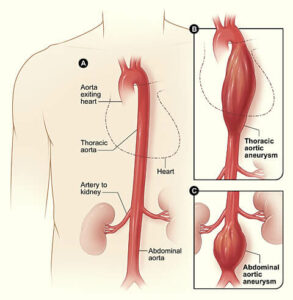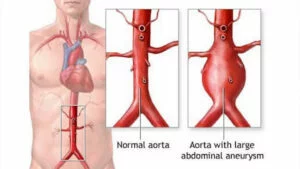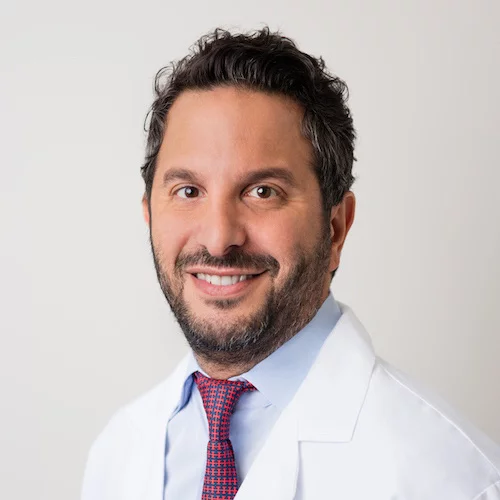Annually, 200,000 Americans are diagnosed with an abdominal aortic aneurysm (AAA). A ruptured aortic aneurysm is the 15th leading cause of death in the US, and the 10th leading cause of death in men older than 55.
What is an Abdominal Aortic Aneurysm?

An Abdominal Aortic Aneurysm (AAA) is a weakened, bulging spot in your abdominal aorta, which supplies blood to the lower half of your body. Screening and detection of this aneurysm can prevent growth, blockage, and rupture. AAA’s don’t always cause problems, but a ruptured aneurysm can be life-threatening. An aortic aneurysm screening can be life-saving.
AAAs usually occur in people ages 65–75 and are more common among men and smokers. There are often no symptoms, but it can sometimes cause pain in the abdomen, back and/or legs due to pressure from disturbed blood flow.
Types of Abdominal Aortic Aneurysms
Aneurysm specialists classify an AAA by its size and the speed at which it grows. Knowing these two factors can help predict the health effects of the aneurysm.
Small AAAs (less than 5.5 cm) grow slower and have a lower risk of rupturing. Doctors suggest safe monitors with regular abdominal ultrasounds.
Large AAAs (greater than 5.5 cm) grow faster and have a higher chance of rupturing, which can cause internal bleeding and other complications. The larger the aneurysm, the more likely surgery will be suggested.
Risk factors for Aneurysms
- Smoking can increase your risk of high blood pressure. Smoking can also damage artery walls, increasing the chance to bulge.
- History of atherosclerosis (thickening of the artery walls)
- Family history of abdominal aortic aneurysm. If a first-degree relative has had an AAA, you are 12x more likely to develop an abdominal aortic aneurysm. 15–25% of patients in treatment to repair an AAA have a first-degree relative with the same type of aneurysm.
- High blood pressure (hypertension) can weaken the walls of your aorta, making an aneurysm more likely to form.
- Vascular inflammation (vasculitis) is inflammation within the aorta or other arteries. These can sometimes cause AAAs.
- High cholesterol or fatty buildup (atherosclerosis)
- Chronic lung disease
What are symptoms of an Abdominal Aortic Aneurysm?
Usually, aneurysms have no symptoms unless they rupture. If an AAA does rupture you may experience the following symptoms:
- Clammy or sweaty skin
- Pains from your abdomen or back to your pelvis, legs, or buttocks
- Sudden pain in the abdomen or back
- Increased heart rate
- Shock or loss of consciousness
Diagnosing an abdominal aortic aneurysm

At Manhattan Cardiology, our NYC aneurysm specialists use ultrasound technology to conduct aneurysm tests. The process is quick, non-invasive, and painless. With a transducer, a technologist uses sound waves, like sonar, to scan for the presence of an abnormally enlarged aorta. An enlarged aorta doesn’t always mean the presence of an AAA, but your Physician and Cardiologist should closely monitor the condition.
Treating an abdominal aortic aneurysm
Depending on the size and location of the aneurysm, your doctor may suggest surgery to repair or remove the damaged tissue.
- Open Abdominal surgery is utilized to remove damaged areas of your aorta.
- Endovascular surgery is less invasive, and uses grafts to repair weakened walls of the aorta.
For a small AAA, your doctor may opt for monitoring instead of surgery as small aneurysms are less likely to rupture.
If you or a loved one are experiencing any of these risk factors, come in and discuss your options for aortic aneurysm screening. Book and appointment with Manhattan Cardiology today.





